
views
For personalized advice, take our Erectile Dysfunction Quiz to find out if you have ED and get access to quick and easy treatment options.
Making Lifestyle Changes

Relax and encourage yourself. Dealing with anxiety or self-doubt can be a major mood killer, so try to be optimistic. Studies have shown that anxiety can interfere with sexual desire, arousal, and orgasm. Approaching sex with confidence, self-respect, and a positive attitude can make all the difference for both you and your partner. Instead of dwelling on negative thoughts about your performance, think to yourself something like, “Sam, finishing fast is common and you shouldn’t get down on yourself. You can deal with this!” Referring to yourself by name can be more effective when practicing positive self-talk.

Work on lasting longer during masturbation. Through the process of edging yourself, you can gain greater control over ejaculation and how quickly you reach climax. Start by masturbating without lube and stop as soon as you start to feel close to ejaculation. Wait for the sensations to decrease, then start masturbating again. You might also try masturbating an hour or two before you have sex to help delay your climax.Did You Know? It’s more than possible to learn how to control ejaculation. If you make an effort, you’ll figure it out in no time.
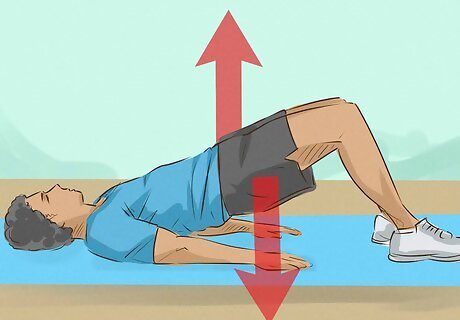
Start doing pelvic floor exercises. Exercising the muscles that control ejaculation can help you last longer. To identify these muscles, stop urination midstream and tighten the muscles that prevent passing gas. To exercise them, tighten them for 3 seconds, then relax for 3 seconds. Repeat this cycle 5 to 10 times. It might be easier at first to exercise while lying down or seated, but try to do them standing, too. As you strengthen the muscles, aim for 3 sets of 10 repetitions per day. Try to only tighten those muscles that help control urination and passing gas. Don’t just flex your buttocks or thighs. Breathe normally as you exercise and avoid holding your breath.

Cut down on alcohol and recreational drugs. Alcohol and recreational drugs can cause premature ejaculation, erectile dysfunction, and other performance issues. Avoid drugs and alcohol before sex and try to cut down your overall use.

Resolve any issues in your relationship. If you and your partner are having any problems, they might be causing you to have performance issues. If you and your partner can come up with a way to resolve these issues together, you'll likely find that your sex life improves and you're able to make sex last longer. You might also consider going to couples therapy if you need help identifying and resolving issues in your relationship.
Trying Techniques During Sex

Try stimulating your partner first. Give your partner some attention without stimulating yourself or letting them touch your sensitive parts. That way, you’ll sync up your levels of excitement and climax closer to the same time.
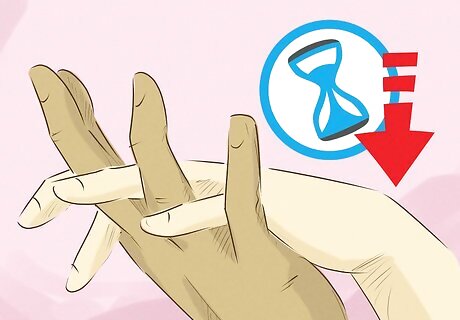
Use slower movements. Taking your time can help you last longer, so try to prioritize the journey over the destination. Approach sex like a sensual dance instead of just a series of rapid movements.

Try new positions. Changing positions can help you refocus your attention and reset your excitement level. Further, trying new positions can teach your body to get out of its normal routine. If you have sex with your partner on top, they can pull away when they sense that you are close to help you last longer. If there's one position that always seems to do the trick for you, save it for last.

Take slow, deep breaths when you feel close. Slowing your breathing as you feel close to climaxing can help shut down the orgasm reflex. Take a slow, deep breath and expand your belly as you inhale. Hold your breath for 2 or 3 seconds, then exhale slowly. Keep breathing slowly until you no longer feel close to climaxing.

Think of something else for a moment. When you feel close, try to distract yourself by thinking about something nonsexual, like work, sports, a TV show, or school. Temporarily diverting your attention can help you relax and slow down. Try not to spend the entire time thinking about something else. You still want to be present and stay focused on pleasing your partner.

Try taking breaks. The stop-and-start method involves withdrawing from your partner when you feel close. Take a break for about 30 seconds, then start having sex again. Repeat the stopping and starting technique until you and your partner are both ready to climax. You can also take deep breaths or think about something else when you take a break.

Give the squeeze method a shot. To use the squeeze technique, withdraw from your partner when you feel close. You (or your partner) then gently squeeze the part of the penis where the underside of the head meets the shaft. Squeeze for a few seconds, then wait about 30 seconds before starting to have sex again. Don’t squeeze too hard, and don’t use the technique if it causes pain or discomfort.
Using Products or Medications

Wear a thicker condom. Check your local drugstore for climax control condoms. They’re thicker, and some brands contain a numbing agent that helps temporarily reduce sensitivity. You might also wear 2 condoms to further reduce sensitivity.
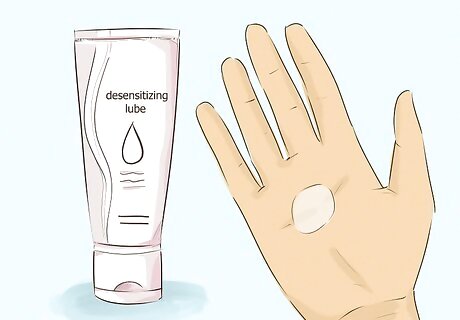
Use a desensitizing lubricant. You can find topical numbing agents online or at your local drugstore. They’re available as creams, sprays, and wipes, and are usually applied 10 to 15 minutes before sex. Wear a condom when using a topical numbing agent to prevent reducing your partner’s sensitivity.

Ask your healthcare provider about prescription medications. If you haven’t had any luck with other solutions, ask your doctor or pharmacist if an oral medication could be effective. Taking a low-dose SSRI a few hours before sex could help delay orgasm. If you experience both erectile dysfunction (ED) and premature ejaculation, prescription medications for ED could be effective for both issues.
Helping Your Partner Last Longer

Approach the subject as a team. Sexual performance can be a sensitive subject. Bring up the topic by telling your partner that you value them and the intimacy you share. Let them know that you don't see it as something they have to fix on their own. Rather, tell them that you want to work on your sex life as a team. You could say, “This isn’t just on you—we should work together to make our sex life the best it can be. Plus, I’m excited to work on pleasing each other as much as possible!”

Reassure your partner that you support them. Try to be optimistic and constructive instead of making your partner feel like there's something wrong with them. Let them know that you understand these problems don't mean that your partner is no longer interested in you. Say something like, “I care about you and want you to know I’m not judging you in any way. I know we can work together to build our physical and emotional intimacy.”

Be open and patient about trying out new techniques. Ask your partner what they think might work. Do your best to keep the conversation honest but low-pressure. Have patience, try out new techniques, and see what works best for you and your partner. Tell them, “This is a process that might take some time, and that’s totally normal. Let’s just try out some new tricks and see what works.” Don't forget that you can also use things other than sex to show your partner how you feel about them, such as back rubs, kissing, or holding hands.

Consider going to couples therapy. Performance issues can put a strain on your relationship. While it's helpful to approach the situation as a team, be honest about all of your feelings, including frustration. Couples counseling could help you and your partner sort out complex emotions and explore issues that might be interfering with intimacy. When you discuss counseling, try not to frame it negatively. Instead, you could say, “We’re both feeling a lot of emotions, and I think a counselor could give us a fresh perspective. It’s better if we sort through our feelings instead of taking them out on each other.”














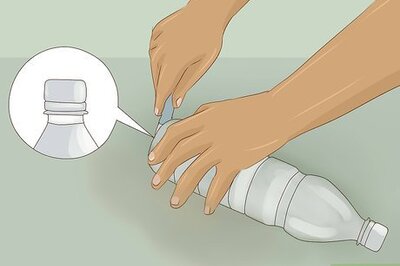




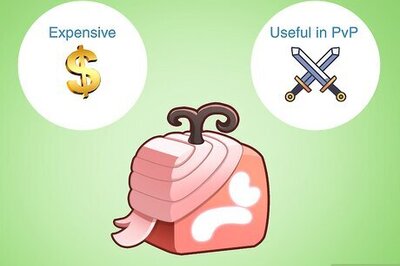
Comments
0 comment